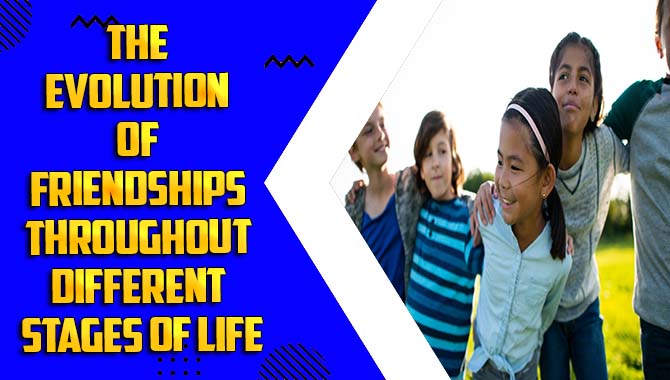Friendships change as we move through different stages of life. The evolution of friendships throughout different stages of life is an interesting topic to explore. It is fascinating to see how our relationships with others change and develop over time.
During childhood, friendships are often based on shared interests and activities. As we grow older, we may start to value different things in our friends. For example, we may place a greater emphasis on trust and support.
As we enter adulthood, our friendships may change again. We may be more selective about who we spend our time with and we may have less time for socialising. However, our friendships can still be an important part of our lives.
It is interesting to see how our friendships change and develop over the course of our lives. It is important to remember that, despite these changes, our friends can still play an important role in our lives.

What Are The Different Stages Of Friendship Development?

The different stages of friendship development are acquaintance, casual friend, close friend, and best friend. When it comes to friendships, there are different stages that people go through. Here are the different stages of friendship development:
- Acquaintance: This is the first stage of friendship where you just meet someone and don’t really know them yet.
- Casual friend: This is the second stage where you start to become more familiar with the person and you might hang out with them occasionally.
- Good friend: This is the third stage where you are now close with the person and you enjoy spending time with them.
- Best friend: This is the fourth and final stage of friendship where you are extremely close with the person and they are like family to you.
A real-life example of this would be if you meet someone at a party and then you become friends with them and hang out with them occasionally. Eventually, you become really close with them and they are like a best friend to you.
What Qualities Are Important In A Friend During Each Stage?

As we move through different stages in life, the qualities we look for in a friend may change. For example, in our teenage years, we may seek out friends who are similar to us in terms of interests and personality.
However, as we get older and enter into our adult years, we may start to value different qualities in our friends.
So,
What Qualities Are Important In A Friend During Each Stage?
Teenage years: During our teenage years, we are often looking for friends who are similar to us. We want friends who share our interests, and who we can have fun with. We may also value friends who are honest and loyal.
Adult years: In our adult years, we may start to value friends who are supportive and understanding.
We may also seek out friends who are different from us, as we can learn new things from them. Friends who are honest and who we can rely on are also important during this stage.
As we move through different stages in life, the qualities we value in our friends may change. However, some qualities, such as honesty and loyalty, are important at any stage.
How Do Friends Change As We Progress Through The Stages Of Life?

Friends change as we progress through the stages of life by becoming less important as we get older.
Most of us have experienced the change in dynamics between friends as we’ve progressed through various stages in life.
It’s not uncommon for these changes to be a source of stress and anxiety, but it’s important to remember that they are a natural part of life. Here’s a look at how friends change as we progress through the stages of life:
- Childhood: During childhood, friendships are typically based on shared interests and activities. There’s a lot of time spent playing together and exploring the world.
- Adolescence: As we enter adolescence, friendships often become more about emotional support. We may confide in our friends about things we wouldn’t tell our parents or other adults.
- Young adulthood: In young adulthood, friendships can be more about shared goals and experiences. We may connect with friends who share our interests in hobbies or our career aspirations.
- Mid-life: Mid-life is often a time when we reassess our friendships. We may find that we don’t have as much in common with our friends as we once did. This can be a difficult time, but it’s also an opportunity to connect with friends in new ways.
- Later life: In later life, friendships may again be based on shared interests and activities. We may reconnect with old friends or make new ones. The important thing is to stay connected to the people who matter to us.
No matter what stage of life we’re in, friendships are an important part of our lives.
They provide us with support, companionship, and a sense of belonging. We may go through periods where our friendships change, but the important thing is to stay connected to the people we care about.
What Role Do Friends Play In Our Lives At Different Stages?

As we go through different stages in life, our friendships also change. These changes can be due to many factors, such as age, lifestyle, interests, and even location.
It’s important to have friends at every stage of life, as they can provide different things that we need at different times.
For example, in our early 20s, we might be more focused on finding our career path and our group of friends can play a big role in helping us figure that out.
They can be a sounding board for our ideas, help us network, and even just provide a shoulder to cry on when we’re feeling lost.
As we enter our 30s and 40s, our friends can help us balance our work and home life. They can offer advice on parenting, help us find a new hobby, or just be there to vent to after a long day at the office.
And in our later years, friends can be even more important. They can help us stay active and social, which is important for our mental and physical health.
They can also provide support as we deal with things like retirement, health issues, and the loss of loved ones.
No matter what stage of life we’re in, friends play an important role. They can make us laugh, help us through tough times, and be a source of support and advice. So reach out to your friends today and let them know how much they mean to you.
What Is The Impact Of Social Media On Friendships?

The impact of social media on friendships is that it can make them stronger or weaker.
In this day and age, social media is a big part of our lives. It can be a great way to keep in touch with friends and family, but it can also have an impact on our friendships.
Some people might find that they are spending more time on social media than they are with their friends in person.
This can lead to feeling like you are missing out on what is happening in your friends’ lives. It can also make you feel like you are not as close to your friends as you used to be.
Other people might find that social media is causing them to compare their life to others. This can lead to feeling like you are not good enough or that your life is not as exciting as your friends’.
So,
What Is The Impact Of Social Media On Friendships?

It really depends on the person. Some people might find that it strengthens their friendships, while others might find that it weakens them.
If you find that social media is impacting your friendships in a negative way, there are a few things you can do. First, try to limit the amount of time you spend on social media.
This will help you to focus on your real-life friendships. Second, try to be aware of the ways social media is impacting your friendships and try to counteract them.
For example, if you find that you are comparing your life to your friends’, try to focus on the positive things in your life.
FAQs
1.How Does Technology Affect The Way We Develop And Maintain Friendships?
Ans: Technology affects the way we develop and maintain friendships in a few ways. First, it can make it easier to keep in touch with friends and family who live far away.
You can stay in touch with them through text, social media, video chat, and other platforms. This can help you feel closer to them and maintain those relationships.
Additionally, technology can also make it easier to meet new people and make new friends. You can use dating apps, social media, and other platforms to connect with people who share your interests.
2.What Are The Challenges Of Making And Keeping Friends As We Get Older?
Ans: There can be several challenges to making and keeping friends as we get older. We may have more responsibilities and less free time, which can make it difficult to cultivate new friendships.
Additionally, we may become more set in our ways and less flexible, which can make it challenging to find common ground with potential new friends.
Additionally, older adults may experience more social isolation and loneliness, which can make it difficult to reach out and connect with others.
3.How Can We Foster Healthy Friendships Throughout Our Lives?
Ans: There is no one answer to this question, as it will vary depending on the person and the situation.
However, some tips on how to foster healthy friendships throughout our lives include: being a good listener, being respectful of others’ boundaries, being supportive and understanding, and being honest with ourselves and others.
Additionally, it is important to be aware of the different stages of friendship and to be patient as relationships develop.
4.What Are The Benefits Of Having Close Friends?
Ans: The benefits of having close friends are numerous. They provide emotional support during difficult times, offer advice and perspective when you’re facing a problem, and are a source of fun and laughter.
Good friends also help you grow and change in positive ways. They challenge you to be a better person and push you to reach your potential.
5.What Do We Need To Do To Nurture Our Friendships?
Ans: We need to be good friends to ourselves first and foremost. From that foundation, we can be good friends to others.
Nurturing our friendships means being kind and compassionate to ourselves and to our friends. It means being honest with ourselves and our friends. And it means being there for our friends when they need us.
Conclusion
The evolution of friendships throughout different stages of life is an interesting topic to explore. It is clear that friendships change and develop as we age, and this is due to a variety of factors.
As we grow older, we become more selective in our friendships, and we also have different needs and expectations from our friends.
Additionally, our social networks change as we move through different life stages, which also affects our friendships. Ultimately, the evolution of friendships is a complex and fascinating topic, and it is one that we will continue to explore throughout our lives.
The evolution of friendships is an interesting topic. If you have any questions, feel free to comment below.


